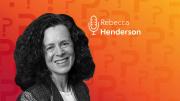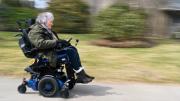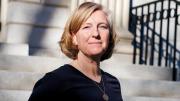When she was an eight-year-old living on Long Island, Alyssa Goodman, Ph.D. '89, wrote to two oceanic research centers, Scripps and Woods Hole. “I wanted to be Jacques Cousteau,” she says. She has since shifted her gaze from deep sea to outer space. Last year, she was appointed professor of astronomy, becoming the second female full professor in that department—and the third in its history. (Nationally, only 5 percent of tenured astronomers are female.) Goodman's research explores the preconditions for star formation, a phenomenon that arises in cores within molecular clouds; gravity, magnetic fields, and gigantic outflows of gas ejected from young stars all play roles. Goodman studied physics at MIT, where a turning point came after her junior year: a Goddard Institute for Space Studies summer program offered her a $2,000 grant, edging out an archaeological dig in the Caribbean that would have cost $2,000. “I went into astronomy for the money!” she laughs. That summer's research led her into astrophysics. Now she has a $75-million grant application at NASA for a satellite that could map the Milky Way's magnetic fields, and teaches undergraduate tutorials, plus graduate courses in radio astronomy and the interstellar medium. A Cantabrigian since 17 (save for three postdoctoral years at Berkeley), Goodman and her husband, associate professor of government Edward Schwartz, now live in Lexington with their two-year-old daughter, Abigail. Goodman sometimes competes in rollerblade races, a breeze compared to astrophysics. “Astronomy is difficult,” she says. “You can only observe; the subject of your experiment is something you can't experiment on.”
Alyssa Goodman
When she was an eight-year-old living on Long Island, Alyssa Goodman, Ph.D. '89, wrote to two oceanic research centers, Scripps and Woods Hole. "I wanted to be Jacques Cousteau," ...
Explore More From Current Issue
The Estate Behind Saint-Gaudens National Historical Park
Park offers art, nature, and history in New Hampshire
Addressing Gaps in Care for Patients with Disabilities
Lisa Iezzoni explores the unmet needs of patients with disabilities.
Harvard Faculty of Arts and Sciences on Discipline and Financial Aid
The Faculty of Arts and Sciences discusses classroom conversations, boosts aid, addresses discipline—and faces austerity





